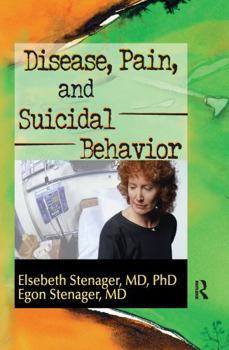Disease, Pain, and Suicidal Behavior
Estimating the risk for suicidal behavior among patients is often a very complex challenge for psychiatrists, general practitioners, psychologists, surgeons, specialists in internal medicine, neurologists, nurses, and social workers. Disease, Pain, and Suicidal Behavior is designed to help you understand the methodological problems involved in the assessment of risk for suicidal behavior in patients with various somatic and psychiatric disorders so you can establish effective approaches to the psychosocial treatment of endangered patients. Through the book's comprehensive and insightful discussions, you will even learn specific strategies for improving the quality of life of such patients.Disease, Pain, and Suicidal Behavior discusses psychiatric disorders such as depression, schizophrenia, personality disorders, anxiety disorders, and alcohol and drug abuse as risk factors for suicidal behavior. From its helpful and clearly written pages, you will also learn about the role of social factors in suicidal behavior and the relationship between suicidal behavior and biological factors. Perhaps most important of all, you will learn which groups of patients and which disorders are associated with the highest risk of suicide through the book's critical discussions of:
the lifetime risk of suicide in depressed patients the stages of diseases like multiple sclerosis and the strains placed on the patient young male schizophrenics and their vulnerability to self-destructive acts mortality in patients with spinal cord injuries forced reduction in daily activities for patients with heart and lung conditions and resulting emotional instability the high risk of suicide immediately after a cancer diagnosis is given identifying risk factors for a second attempt at suicide questions to ask those at risk for suicidal behaviorRecognizing which of your patients run the risk of committing suicide can be an overwhelming task because of the multiplicity of factors involved. Disease, Pain, and Suicidal Behavior, because it examines critically the existing literature and studies on suicide and suicide risk, can help you evaluate and prevent suicidal behavior in a timely manner. You will turn the last of its pages with a much improved understanding of which illnesses and sufferings present an increased risk of suicidal behavior.




